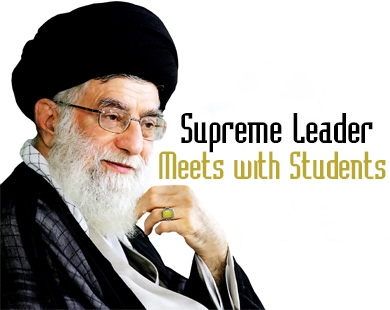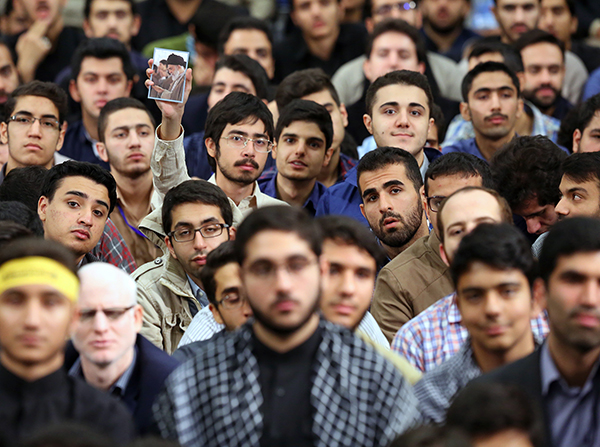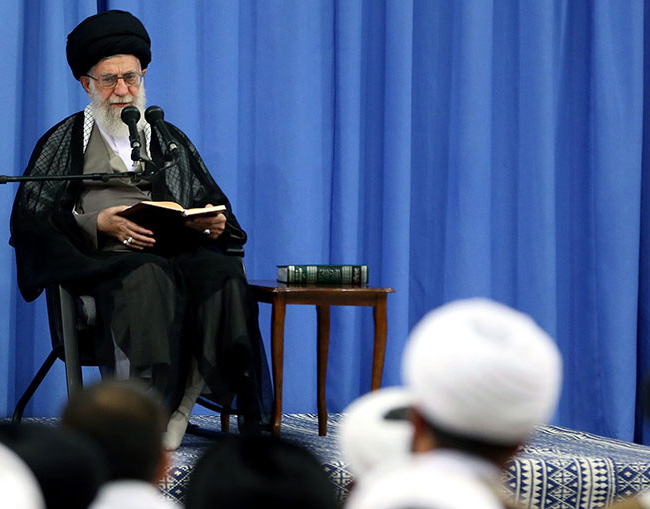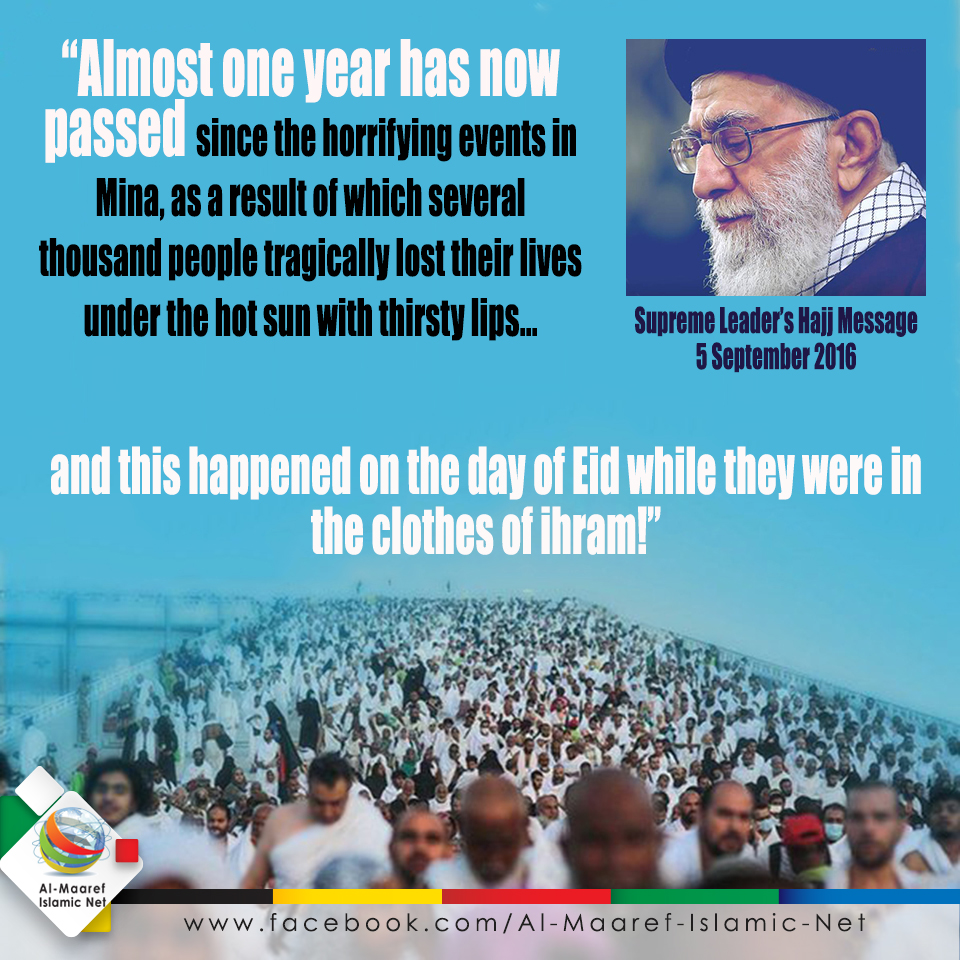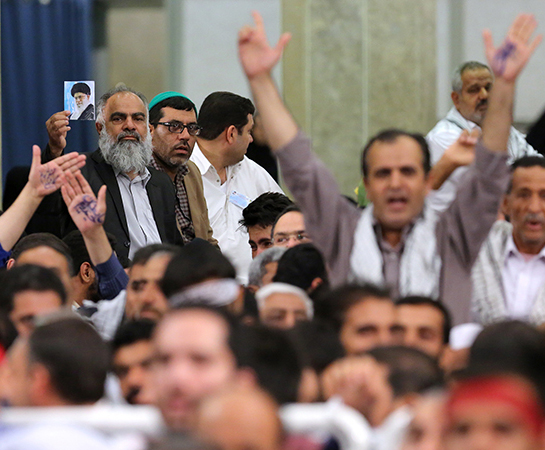Ayatollah Khamenei the Supreme Leader of the Islamic Revolution met Sunday
evening with a group of students. At the meeting, His Eminence referred to
different scientific, academic, cultural, social, economic and political issues.
He also pointed to the relationship between idealism and realism, the
responsibilities of students and ways to create dynamism and enthusiasm in
academic environments.
The Supreme Leader of the Islamic Revolution described the viewpoints expressed
by the students in the meeting as fully informed. He called on different
organizations to make efforts in order to put these ideas into practice.
When asked about the meaning of moderation, Ayatollah Khamenei reiterated: "The
President-Elect who has mentioned this slogan will definitely explain what he
means by moderation."
Referring to the statements of a student who asked how one should behave towards
the new administration, His Eminence stressed: "I believe that all
administrations - including the newly elected administration which, by Allah's
favor, will be formed in a couple of weeks - should be supported, assisted and
cooperated with."
He added: "A number of people say, 'only if the administration behaves in a
certain way, will we help it. Otherwise, we will criticize it.' I am not against
criticisms, but first, making criticisms is different from finding faults.
Second, the new administration should be given some time in order to develop its
activities and increase its efforts."
The Supreme Leader of the Islamic Revolution described the responsibilities of
the executive branch as very difficult, stressing: "There is no one who does not
have any weak points. Therefore, one should not raise expectations so much so
that they cannot be met."
Ayatollah Khamenei stressed that students should not let their differences of
opinion lead to hostility and resentment, saying: "I seriously ask everyone to
avoid letting their differences of opinion with other people - in the way one
analyses and interprets certain realities - lead to hostility and resentment."
His Eminence reiterated: "As Imam (r.a.) recommended, you should behave like
seminarians, who are very serious when they debate with one another, but who
behave in a friendly way towards one another at other times."
Pointing to the viewpoints of students about the events of the year 1388, he
said: "I request that when you speak about the events of the year 1388, you pay
attention to the main issue in these events. This main issue is the fact that a
group of people stood up against the lawful current in the country in an illegal
and unprincipled way and they harmed the country. Why do you forget this?"
The Supreme Leader of the Islamic Revolution reiterated: "After the elections in
the year 1388- why did those who thought the elections had been rigged cause
mayhem in the streets? Why do they not answer this question? We put this
question to them - not in public meetings, rather we did it in a way that they
could answer - but they did not answer. Well, why do they not apologize? In
private meetings they say, 'We admit that the elections were not rigged.' Well,
if the elections were not rigged, then why did you harm the country? Why did you
impose unnecessary expenses on the country?"
Expanding on the events of the year 1388 and referring to a number of tumultuous
and bloody events currently happening in certain countries in the Middle East
region, Ayatollah Khamenei said, "Do you know what would have happened to the
country if God had not helped our nation and if different groups of people had
violently confronted one another?"
His Eminence pointed to the statements of a student about vehemence of action,
adding: "If by vehemence you meant seriousness in the way you debate, there is
nothing wrong with it. But if you meant something else, I do not agree. I do not
agree that you should act in a severe way when you are faced with people who are
opposed to your ideas or a phenomenon which is contrary to the way you think."
He called on academic environments to carry out in-depth research about Islamic
Awakening and its rise and fall in regional countries. He stated: "Islamic
Awakening is a very important phenomenon and it cannot be destroyed by arrogant
antitheses."
The Supreme Leader referred to a number of events in certain regional countries,
saying: "As you can see, the events which occur in Egypt and in a number of
other countries signify that Islamic Awakening exists in these countries. Of
course, such events were not managed in a good way. They made foolish mistakes."
Ayatollah Khamenei added: "Today, global arrogance has a peculiar deployment. It
has built a long rampart against such an awakening. You can see parts of this
fortification in these regional countries, in these regional events and in
similar events in our own country."
His Eminence stated: "One of the issues which can be studied and researched is
the strategic depth of the Islamic Revolution in regional developments. When one
looks at regional developments, one notices something which is the strategic
depth of the Islamic Revolution in these countries. There are certain events
which act like a tree root or like the pieces of rope which support a tent.
These events are considered as a source of strength for a country. This is
strategic depth."
He added: "In those days, the reason why Imam (r.a.) was outspoken on the issue
of revolutions in other countries and on revolutionary movements was that he
wanted to create such a depth and he created it. Today, global arrogance is
nervously fighting against this strategic depth. Of course, their efforts have
not produced and will not produce any results."
The Supreme Leader of the Islamic Revolution pointed to the efforts of the
enemies of Islam for creating discord between Shia and Sunni, stating: "They
suppress Shia Muslims in different parts of the world because they think that
Shia Muslims are a natural base for the Islamic Republic. But they do not know
that in many countries, Sunni brothers defend the Islamic Republic more
strongly."
Elsewhere in his statements, the Supreme Leader of the Islamic Revolution
addressed a number of issues which the students in the meeting had raised.
He stated that the ideals of the Revolution cannot be achieved without the
energy, enthusiasm and courage of our youth: "Based on this, the role of the
youth in achieving the ideals of the Revolution should be taken seriously
because I believe that youth have the capability to solve problems."
Another issue which Ayatollah Khamenei addressed was the relationship between
ideals and realities: "For example, sanctions are a reality and, on the other
hand, economic progress is one of the ideals of the Revolution. Now the question
is: how is economic progress possible in the face of realities such as
sanctions?"
The Supreme Leader of the Islamic Revolution stressed: "On the issue of the
relationship between idealism and realism, we thoroughly approve of both
idealism and realism."
His Eminence stated: "Idealism without realism will result in illusions. Of
course, we should distinguish between reality and what is suggested as reality."
He said that one of the common methods used in psychological warfare is
instilling false realities into the minds of people, stressing: "The reason why
we speak about wisdom and foresight is this. One of the functions of foresight
is to help people see realities the way they are."
The Supreme Leader of the Islamic Revolution mentioned that another method used
in psychological warfare is magnifying certain realities and ignoring others,
saying: "For example, one of the realities is that a number of outstanding
personalities leave our country. But there is another reality which is the fact
that there is a considerable increase in the number of outstanding students in
our country. However, those who propagandize against the Islamic Republic
magnify the first reality and ignore the second one. They do not mention it at
all."
Ayatollah Khamenei added: "I expect the dear students to always and in all
conditions pursue ideals by adopting a realistic outlook."


